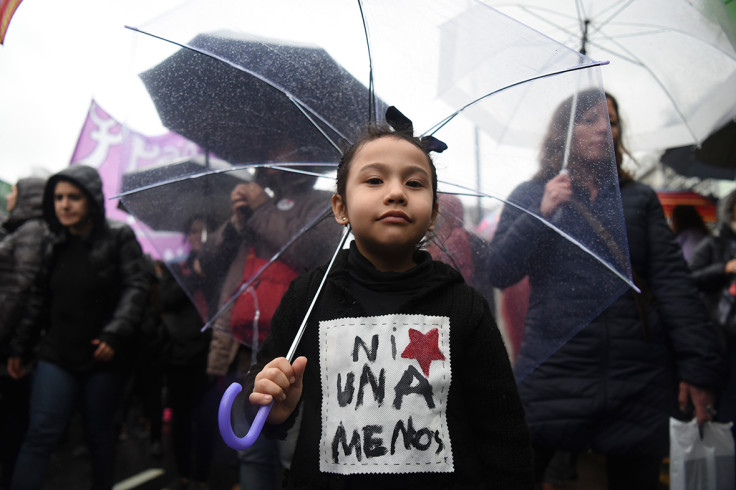Fatal rape of teenage girl in Argentina spurs #NiUnaMenos solidarity protests across Latin America
From Mexico to Argentina, thousands of people took to the street to demand an end to gender-based violence.
Women across Latin America marched in solidarity with the victims of gender-based violence on 19 October, named Black Wednesday (miercoles negro in Spanish) by the protestors.
The protest was first called in Argentina, after the fatal rape of a teenage girl in the town on Mar del Plata on 8 October. Lucia Perez, a 16 year old girl, was one of the 19 women who were murdered by men, in what is referred to as feminicide, in Argentina in the first half of the month. Three women were killed by their partners since Lucia Perez's death.
The Argentinian Supreme Court recorded 235 feminicides in 2015, approximately one every 36 hours. Around one in five of the victims are teenagers. According the Gender Equality Observatory for Latin America and the Caribbean, 1903 women were murdered because of their gender in fifteen Latin American countries and three Caribbean nations in 2014.
Women across in Latin America organised themselves under the protest movement #NotOneLess (#NiUnaMenos in Spanish) to demand an end to gender-based violence and justice for the victims. Massive demonstrations were organised in June 2015 in Argentina, Chile, and Uruguay and were repeated in the summer of 2016.
More than a year later, photos of solidarity protests organised in support of victims of gender violence on Black Wednesday in 17 Latin and Central American countries, show that the movement is as strong and as united across the continent.

On social media, messages of solidarity to the demonstrators poured from across the world using the hashtags #VivasNosQueremos (we want to live), #MiercolesNegro, #NiUnaMenos and its various local translations.
In Argentina, protesters filled the centre of the capital Buenos Aires.
Today, yet again, #Argentina says NO to Gender Based Violence.#NiUnaMenos #MiercolesNegro #VivasNosQueremos #ParoNacionalDeMujeres pic.twitter.com/MwLLpuLIrA
— Javier Hasse (@JavierHasse) October 19, 2016
Men marched alongside women too to show their support to the cause. "I am almost naked, surrounded by the opposite gender... and I feel safe, not intimidated. I want the same for them".
Esta foto es maravillosa. #Argentina #NiUnaMenos #MiercolesNegro pic.twitter.com/re99J5cncg
— Alà BM (@AliBerMer) October 20, 2016
In neighbouring Chile, demonstrations were held in different cities across the country. "We are the cry of those who do not have a voice".
#NiUnaMenos Compartiendo imágenes de la marcha de hoy (3) pic.twitter.com/BkHjHWWSS6
— Roberto Bravo Vidal (@robertobravovid) October 20, 2016
In Peru women held a vigil in Lima.
#NiUnaMenos #Perú pic.twitter.com/ZiGUciN0WB
— Abraham Valencia (@AbrahamVaIencia) October 19, 2016
The rain did not stop demonstrators in Uruguay.
#NiUnaMenos #MiercolesNegro #Uruguay pic.twitter.com/Nc4UU0q09E
— Tichola (@OveggiItaliani) October 19, 2016
Women took to the streets in Caracas, Venezuela's capital. "We are also joining the demonstration".
#NiUnaMenos también nos unimos al paro en Caracas pic.twitter.com/F3xvaCMEot
— Alejandra laprea (@AlejaLaprea) October 19, 2016
Women marched in La Paz, Bolivia. "It was not a crime of passion it was patriarchal violence".
No fue crimen pasional fue violencia patriarcal #NiUnaMenos #LaPaz #Bolivia pic.twitter.com/SvYZQ99GkT
— Adri Zurita (@adrilu199) October 19, 2016
A similar march took place in Paraguay. "Women against macho violence. It is the continental uprising against femicide"
Assunção, no Paraguai
— Midia NINJA (@MidiaNINJA) October 20, 2016
Mulheres contra a violência machista. É o levante continental contra o feminicÃdio.#NiUnaMenos
Foto: RTV Paraguay pic.twitter.com/h7owpihXaA
"Ecuador [stands in] solidarity with the Argentinian women"
#NiUnaMenos Ecuador solidaridad con las mujeres argentinas pic.twitter.com/rzCKhmuOi3
— MarchaPutasEcuador (@MarchaPutas) October 20, 2016
Women in Colombia joined in too.
Desde #Ibagué #VivasNosQueremos #NiUnaMenos pic.twitter.com/2ZXYK3jmkg
— Red Nacional Mujeres (@RNMColombia) October 20, 2016
"In Portuguese, #NiUnaMas translates to #NemUmaMenos. Brazil is also joining".
En Portugués #NiUnaMenos se dice #NemUmaAMenos.
— Nacho Lemus (@LemusteleSUR) October 19, 2016
Brasil también se suma. pic.twitter.com/Hn4Un6sEUo
Central American countries also held solidarity events during the day and the night.
En México también queremos paz, tranquilidad, no queremos más muertas ni muertos #NiUnaMenos pic.twitter.com/7wra2xFIBi
— Claudia (@kLaU105) October 20, 2016
#NiUnaMenos #paromundialdemujeres #Managua #Nicaragua representa #MiercolesNegro #FuriaBebe @hindelita @fetchevestn @malepichot @srtaBimbo pic.twitter.com/sVZYtnt2M7
— Tagni Li Moncada (@TagniLi) October 20, 2016
#NiUnaMenos en Tegucigalpa, #Honduras - a pesar de la lluvia #NosotrasParamos en defensa de las #mujeres pic.twitter.com/Qa9h41JHwD
— CDM (@CDMHonduras) October 20, 2016
Desde #Guatemala decimos:#NiUnaMenos pic.twitter.com/5GDKxmQVGK
— Makumba (@Maquitory) October 20, 2016
En El Salvador decimos : #vivasnosqueremos #libresnosqueremos #NiUnaMenos pic.twitter.com/RwYzwfojZB
— Sara Garcia (@SaraVegana) October 20, 2016
#CostaRica #NiUnaMenos #VivasNosQueremos ¡Mi cuerpo es mÃo! pic.twitter.com/pEs9QoSWTm
— Amanda Castro (@Amanjoche) October 20, 2016
#NiUnaMenos #VivasNosQueremos #Panama #Feminismo pic.twitter.com/ORDNchAVfd
— Georgina Tovar (@GeorginaT10) October 20, 2016
More protests are scheduled to take place across the world around the date of 25 November, the UN-observed international day for the elimination of violence against women.
© Copyright IBTimes 2025. All rights reserved.






















